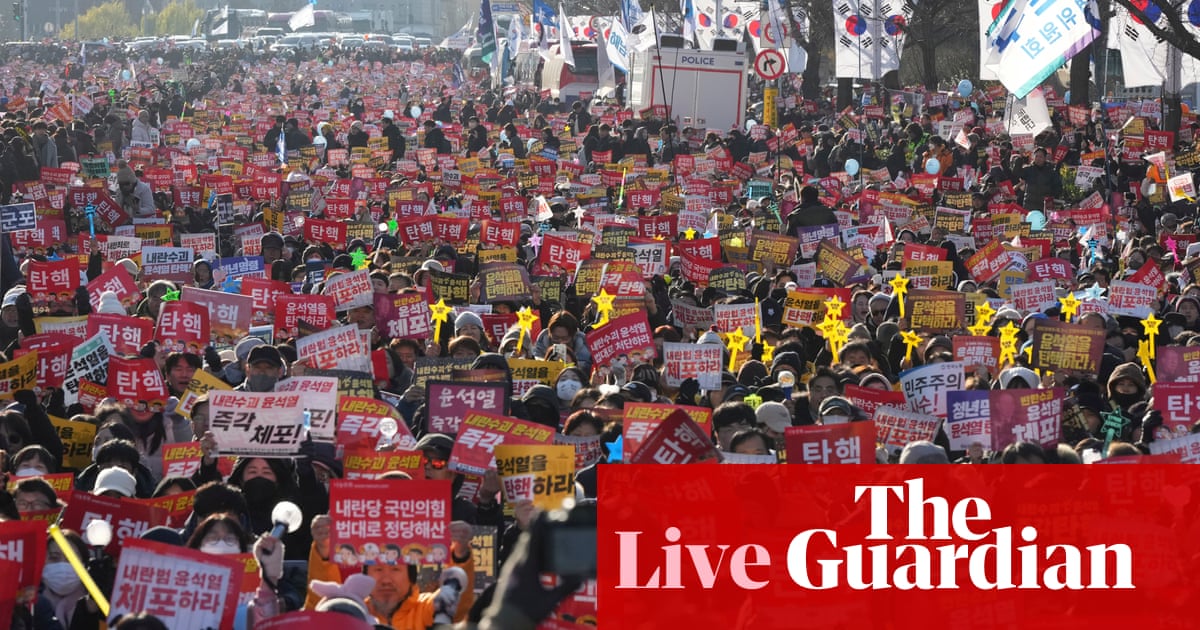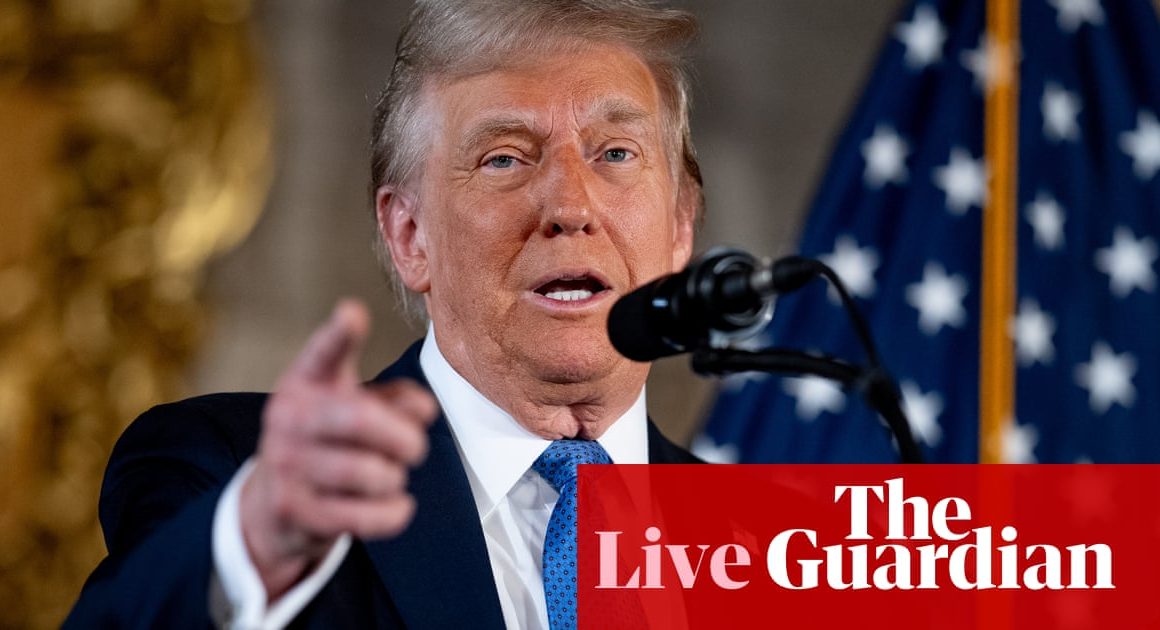Key events
Arirang TV in South Korea is reporting that all 300 members of the National Assembly have cast their votes.
As a reminder, for the impeachment vote last Saturday, the ruling party lawmakers left the building before the vote took place.
My colleague Raphael Rashid has sent this photo of the scene just outside the chamber in the National Assembly building:

Raphael Rashid
From inside South Korea’s parliament building I can see massive crowds through the glass doors of the main hall. The hopes of an entire nation are visible in front of me.
There is a huge media presence outside the main chamber as journalists wait for the votes to be counted.
Some journalists have reportedly been wearing black as a form of protest against the attack on press freedom that could have become a reality had Yoon’s declaration of martial law survived more than a few hours.
Voting has been completed and the counting is now beginning.

Justin McCurry
Raphael Rashid, the Guardian’s reporter in South Korea, is following the vote from inside the National Assembly building.
He says there was a “huge roar” calling for Yoon’s impeachment from the crowd outside as voting got under way.
Who is Yoon Suk Yeol?
While we wait for the result, here is the Guardian’s profile of Yoon Suk Yeol.
For Yoon Suk Yeol, it appears, the tables have turned.
In 2017 the then prosecutor general led the legal action to remove then-president Park Geun-hye from office after she was convicted of abuse of power.
Now, in the most bizarre, chaotic, few hours in recent South Korean political history, Yoon himself is facing the music.
It took just hours for Yoon’s position as president to go from precarious to untenable. Two years after he was sworn in after a bitterly divisive election, it is hard to see how Yoon, an arch conservative, can survive Tuesday’s disastrous attempt to impose martial law.
Opposition parties are mustering their forces – which potentially include members of Yoon’s own People Power party – in anticipation of an impeachment vote in the same national assembly that voted to immediately lift martial law around six hours after it was imposed.
While Asia’s fourth-largest economy – and neighbour to a hostile nuclear-armed North Korea – reels from the political turmoil Yoon fomented – it appears that only his resignation will halt attempts to make him the second South Korean president to be forced from office since the country became a democracy less than four decades ago.
While Yoon beat his Democratic party challenger, Lee Jae-myung, in their March 2022 presidential election, the momentum is now with Lee, who led the challenge to martial law in the early hours of Wednesday.
Yoon had attempted to justify the imposition of martial law by referencing the presence in South Korea of “shameless pro-North Korean, anti-state forces” determined to destroy [South Korea’s] democracy, although he did not offer any evidence for his claim.
It is far more likely that other, less fanciful, factors were behind his decision.
Yoon, a controversial figure who is rumoured to have consulted shamanistic healers before deciding not to move into the president’s official Blue House residence, vowed to take a hardline stance against North Korea, ending attempts by his liberal predecessor, Moon Jae-in, to engage with the regime through summits with its leader, Kim Jong-un.
Voting is now beginning. The process has been explained to lawmakers. We’ll bring you the result as soon as we get it.
Tens of thousands of people have braved the bitter cold and poured onto the streets of the capital, Seoul, every night for the past two weeks, calling for Yoon’s ouster and arrest. They shouted slogans, sang, danced and waved K-pop light sticks. Smaller groups of Yoon’s conservative supporters — still in the thousands — have also been rallying in Seoul, denouncing attempts to impeach the president. Both rallies have largely been peaceful.
“Many people are using idol light sticks even though they are expensive. I think it’s become a really great culture because people are bringing their most precious and brightest possessions to express their will and opinions,” said Hong Gayeong, a 29-year-old protester, near the National Assembly.
Here is the scene outside parliament in Seoul:

Justin McCurry
Park said South Korea’s democracy owed much to the pro-democracy protests in the southern city of Gwangju in 1980, when demonstrators were killed and injured in a bloody crackdown. “Martial law should only be proclaimed when the state is in an emergency or a state of war,” Park said of Yoon’s short-lived declaration on 3 December. “However, those conditions did not exist.”
“Yoon Suk Yeol is the leader of this insurrection,” Park has declared.
“If it weren’t for citizens who rushed to the National Assembly, South Korea would not be different from 1980,” Park Chan-dae has said, referencing the 1980 Gwangju massacre that occurred under military rule and said that without the South Korean people’s intervention, the country would have been taken back to 1980 by Yoon’s declaration.
Park Chan-dae, the floor leader of the Democratic party of Korea – the main opposition party – is reading out the reasoning for impeaching the president, including the content of his martial law declaration.
The National Assembly session debating the impeachment of the president, Yoon Suk Yeol, is now under way.
President’s party to vote against impeachment – reports

Justin McCurry
South Korea’s ruling party has decided to maintain its official position to vote against the impeachment of president Yoon Suk Yeol, local media has reported.
Last Saturday’s first impeachment vote ended in disarray after most members of Yoon’s conservative People Power party (PPP) boycotted the impeachment vote. But PPP lawmakers are expected to turn up to vote today.
Opening summary
Hello and welcome to the Guardian’s live coverage of the continuing political crisis in South Korea, where the parliament is preparing to vote for the second time on a motion to impeach the president, Yoon Suk Yeol, after his failed attempt to impose martial law.
Thousands of people have already taken to the streets of Seoul today in rival rallies for and against Yoon, hours ahead of the impeachment vote.
Protests demanding Yoon step down kicked off around midday outside the National Assembly, which will vote at 4pm (0700 GMT) on an impeachment resolution – a week after a first attempt to remove Yoon for the martial law debacle failed.
Police expect at least 200,000 people to demonstrate in support of removing him.
On the other side of Seoul near Gwanghwamun square, thousands more rallied in support of Yoon, blasting patriotic songs and waving South Korean and American flags.
Two hundred votes are needed for the impeachment to pass, meaning opposition lawmakers must convince eight parliamentarians from Yoon’s conservative People Power party (PPP) to switch sides. Seven have pledged to do so.
Here’s what else happened this week:
-
Yoon defended his shock decision to impose martial law in a defiant and lengthy TV address on Thursday, vowing to “fight until the end” attempts to remove him from office. He repeated claims that he had been trying to defend the country from anti-state forces
-
On Wednesday, police raided Yoon’s office, in an attempt to establish whether Yoon’s actions amounted to insurrection. It emerged later that Yoon’s security guards had prevented officers from getting into the main building
-
Yoon’s former defence minister and one of his close associates, Kim Yong-hyun, tried to kill himself at a Seoul detention centre on Wednesday night, but was stopped by correctional officers. He had been arrested on allegations of playing a key role in a rebellion and committing abuse of power, becoming the first person formally arrested over the martial law decree
-
The country’s police chief and the head of Seoul’s metropolitan police were also detained for sending their forces to the national assembly. Lawmakers voted on Thursday to impeach the police chief and the justice minister.
-
Yoon was banned from leaving the country on Monday, and on Tuesday authorities banned more senior officials from leaving, including Cho Ji-ho, the commissioner general of the Korean National Police Agency. Already under a travel ban were the former defence and interior ministers and the martial law commander, Gen Park An-su.










